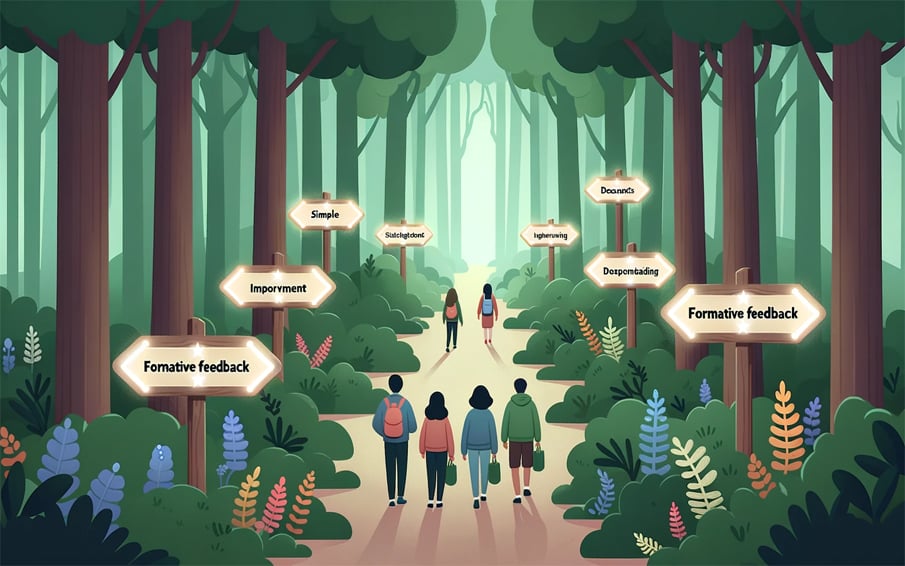Every learner, at some point in their life, has encountered feedback. Yet, not all feedbacks are the same. Have you ever gotten advice that propelled you forward, encouraged improvement, and heightened your understanding? This, my friend, is the essence of formative feedback. Dive in as we unravel this crucial element in the learning process.

The Heartbeat of Learning: Formative Feedback Definition
At its core, what is formative feedback? It’s like a GPS for learners, providing real-time directions, suggesting alternate routes, and confirming when you’re on the right track. Formative feedback is ongoing, actionable advice given during the learning process to help students understand and improve their performance.
Imagine baking a cake for the first time. You’re unsure about the oven temperature or the consistency of the batter. Now, suppose a seasoned baker watches over, guiding you, making suggestions, and giving insights based on the batter’s texture or the oven’s heat. That’s the definition of formative feedback for learning in action!
Peeling Back the Layers: Formative Feedback Meaning
Understanding formative feedback is like peeling an onion, where each layer gives a deeper insight into its significance in the learning journey.
More Than Just Grades
Grades merely scratch the surface of a learner’s understanding. Unlike summative feedback, which often culminates in a grade, formative feedback dives deep. It’s about recognizing strengths, identifying gaps, and paving a way forward. Think of it as your favorite coach – not just telling you your score but also showing you how to ace the game.
Tailored for Growth
Wouldn’t it be great if feedback was customized just for you? Well, that’s the charm of formative feedback. It isn’t generic. It’s feedback sculpted to your needs, ensuring you know exactly where to focus your energies.
The Art and Science of Effective Formative Feedback Examples
Feedback isn’t just about pointing out what’s wrong. It’s an art – striking the right balance between encouragement and constructive critique. Let’s decode this with a few examples:
- Scenario 1: Instead of saying, “Your essay lacks depth,” a more formative approach might be, “You’ve touched upon some intriguing points in your essay. How about exploring ‘X’ aspect a bit more to give your arguments greater depth?”
- Scenario 2: In a dance class, rather than stating, “Your movements are off,” a teacher could say, “I noticed you’ve got the basic steps. Focusing a bit more on your timing will make the entire sequence flow smoothly.”
Do you see the difference? It’s not about what’s missing, but how you can enhance what’s already there.
Why Embrace Formative Feedback for Learning?
Incorporating formative feedback into the learning process is akin to adding a turbocharger to a car. It boosts performance, ensures smoother journeys, and optimizes outcomes.
A Catalyst for Improvement
Feedback, when presented right, can be a powerful motivator. It ignites a desire to do better, urging the learner to push their boundaries. After all, who doesn’t appreciate a roadmap to success?
Fosters a Growth Mindset
Remember the joy of unlocking a new game level or figuring out a puzzle? That’s the thrill of growth. Formative feedback fosters this mindset, making learners see challenges not as obstacles but opportunities to evolve.
Nurtures Self-awareness
Have you ever had that ‘aha!’ moment when someone pointed out something you never noticed before? That’s the beauty of formative feedback. It’s like holding a mirror to your skills, illuminating areas that might’ve remained in the shadows otherwise.
Conclusion
Just as a maestro guides an orchestra towards a harmonious performance, formative feedback acts as a guiding beacon for learners. It isn’t about criticism but about channeling potential in the right direction. So, the next time you encounter formative feedback, remember – it’s not about where you went wrong, but how you can shine even brighter. And isn’t that a perspective we’d all love to embrace in our learning journey?


